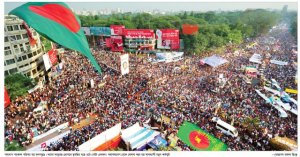This is the first in a series of five blog posts by Razia Shariff, a Doctoral candidate in the Politics and International Relations programme, as she conducts her field work on the Agency of Social Movements in Bangladesh.
By Razia Shariff (PhD candidate)
You may well have heard of Bangladesh in the news, because of floods, poverty, maybe even the Nobel prize winner the Grameen Bank, or the Rana Plaza garments building collapse in 2013 and the subsequent campaign against cheap clothes. What you may not have heard about is the Shahbag Movement one of the biggest spontaneous social media mobilized social movements in Bangladesh’s history (quite a claim given the number of weekly strikes ‘hartals’, demonstration and political rallies which bring or rent in the crowds).

For my PhD research I am exploring the collective agency capability of civil society in the UK and Bangladesh. I am interested in the Shahbag movement because from the 5th – 27th February 2013 it demonstrated most of the key capabilities needed for collective agency. For the next three months I will be collecting oral histories in Bangladesh of those involved in the movement to understand the process, agency and actions of the movement during that time to develop a capabilities conditions framework to support collective agencies capability in civil society.
So I thought I would share some of my reflections during my research field work, but first to set the scene and explain some background to the Shahbag movement and why I need to try and ignore the ‘politics’ involved ! This is the unemotional version of events to explain the reason for the demands of the shahbag movement, apologies in advance for my bland presentation of the history.
In 1971 Bangladesh became independent after a 9 month civil war to liberate itself from Pakistan, the international community saw it as an Indo-Pakistani war (Bangladesh was then east Pakistan – a colonial legacy from the partition of India), many saw it as a succession movement, but most of the people of Bangladesh saw it as the creation of a secular, democratic Bengali nation. Unfortunately there were those in Bangladesh, collaborators, who wanted to remain part of a Muslim Pakistani state and worked with the Pakistan army to kill 300, 000 citizens, rape and torture of over half a million citizens, and created a further 40 million citizens who were displaced or became refugees in India during the struggle. Much has been written about the liberation movements origins and the genocide in Bangladesh during this time. See for example: http://en.wikipedia.org/wiki/Bangladesh_Liberation_War and http://www.semantikoz.com/blog/timeline.html
Sheikh Mujibur Rahman, leader of the Awami League, who had won a majority in the east and west Pakistan elections in 1970, but then denied the right to take over power in Pakistan was arrested and taken to Pakistan during the civil war, and when released became the first Prime Minister of Bangladesh. In 1972 a Bangladesh Collaborators (Special Tribunal) Order was passed to set up a special court to try those who committed crimes against civilians during the liberation war. Sheikh Mujib and all his family members, apart from 2 daughter who were in Europe, were assassinated in 1975 including a pregnant daughter in law and his 5 year old son. Subsequently there were a number of military regime changes, coups and counter coups, and in 1975, the then government passed an Ordinance to repeal the 1972 Order to try the collaborators and gave them amnesty. With the establishment of a neutral ‘caretaker government’ during elections a number of semi democratic elections were held, the main political parties alternating in victory, the Bangladesh Nationalist Party, and the Awami League (Headed by Sheikh Mujib’s eldest daughter Sheikh Hasina). In 2008 the Awami League came back into power and started the process of reviewing the 1975 Repeals Ordinance which found it unlawful, and re-established the special courts as the ‘International Crimes Tribunal’ (ICT) to continue trying the self proclaimed collaborators of the 1971 liberation war, all of whom had done very well for themselves holding prominent positions of power in the Muslim Bengali community both in Bangladesh and abroad.
For one of the first key collaborators to be tried the verdict was ‘life imprisonment’ rather than the death penalty (yes I know a big ethical and moral contention re capital punishment but in Bengali politics with regular regime changes ‘life imprisonment’ means at most a 4 year jail sentence, a pardon from the President and then never to be tried again). This was the catalyst for the start of the Shahbag movement, with over 100,000 Bengali’s in Bangladesh involved, supported by the Bengali diaspora around the world demanding justice.
The next blog in January will explain how Shahbag’s celebratory, non-violent movement developed, the changes that were made by the government with the ICT Amendment Act and the violent reactions by Muslim organisations.
 Politics
Politics Anna Vanaga
Anna Vanaga 1352
1352


